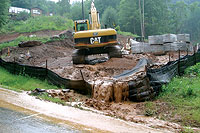Cloudy currents

courtesy Mountain Voices Alliance
|
When slope development or intensive grading projects go awry, leaving topsoil churned up and liquefied into a muddy eyesore, storm-water and erosion-control issues take center stage. A storm-water ordinance passed recently by the Buncombe County Board of Commissioners (see “Storming the Barricades,” Oct. 4 Xpress) will impose fines on developers when ineffective storm-water-control systems result in land disturbances.
But who’s keeping watch over the less visible, long-term impacts of muddied rainwater — once it has been washed over impervious surfaces, infused with traces of motor oil and other chemicals, and discharged as runoff into streams?
“Dirt is the number-one pollutant” in local waterways, according to Laurie Saxton, who works in the City of Asheville’s Stormwater Services program. “The cloudier [water] gets, the warmer it gets.” Water temperature is an important factor to assess, she notes, because local trout populations can only thrive in cold streams. According to a report on water quality published by the state Department of Environment and Natural Resources (DENR), “suspended sediments can clog the gills of fish, reducing their respiratory abilities.” In addition, pollutants such as fertilizers, pesticides, pet waste and other chemicals that routinely wash into streams can degrade water quality, sometimes rendering streams and creeks unfit for swimming or boating.
To gain a better sense of the health of local waterways, Clean Water for North Carolina and other regional environmental groups have formed the Stream Monitoring Information Exchange, a program that offers volunteer training in biological stream monitoring and works directly with the DENR to identify waterways in need of additional protection.
Linda Wiggs, environmental specialist at the regional office of DENR’s Division of Water Quality, says chemical stream monitoring is conducted monthly at 48 stations throughout Western North Carolina, while biological monitoring is carried out on a five-year cycle. “It helps us immensely when citizens take an interest,” she says, noting that “we just don’t have enough people” to get out to every site that may need attention.
A training held by SMIE at Haywood Community College on Oct. 7 taught volunteers to determine the health of aquatic communities by looking for biological indicators, such as certain water-loving insects. Trainees will assist with monitoring efforts in Haywood, Madison and Buncombe counties in coming months.
Meanwhile, Saxton is working to promote citizen participation in another stream-monitoring effort, called World Water Monitoring Day. Scheduled for Oct. 18, the effort links participants via a Web site where they can post independently collected water-testing results and track data over time. While there is no event scheduled for the annual program, those interested can register and order water-test kits at www.worldwatermonitoringday.com.
WANTED: sustainable advisors
Got any green ideas? Here’s a chance to have your say in local government. Applications to serve on the Sustainable Energy and Advisory Committee, which was given the stamp of approval by Asheville City Council on Sept. 26, are due in to the city clerk by Oct. 14. Spearheaded by council member Robin Cape, the committee will work toward developing an “Energy and Environment Vision Plan,” creating programs to raise community awareness of environmental issues and advising city government on sustainability.
“People are very concerned about our relationship to energy,” Cape said in an interview with Xpress. “City government needs to be a part of that dialogue.” The committee will have nine members in all, with four seats filled by representatives from the fields of energy management, construction, real estate development and local business. The five remaining seats will go to community members at large.
Applications to serve on the committee can be found on the city Web site, www.ashevillenc.gov. Follow the link for administration, go to the city clerk page, follow the “boards and commissions” link and, finally, click on “application” to download the form. Completed applications can be e-mailed, faxed, mailed or hand-delivered to the city clerk.


Before you comment
The comments section is here to provide a platform for civil dialogue on the issues we face together as a local community. Xpress is committed to offering this platform for all voices, but when the tone of the discussion gets nasty or strays off topic, we believe many people choose not to participate. Xpress editors are determined to moderate comments to ensure a constructive interchange is maintained. All comments judged not to be in keeping with the spirit of civil discourse will be removed and repeat violators will be banned. See here for our terms of service. Thank you for being part of this effort to promote respectful discussion.